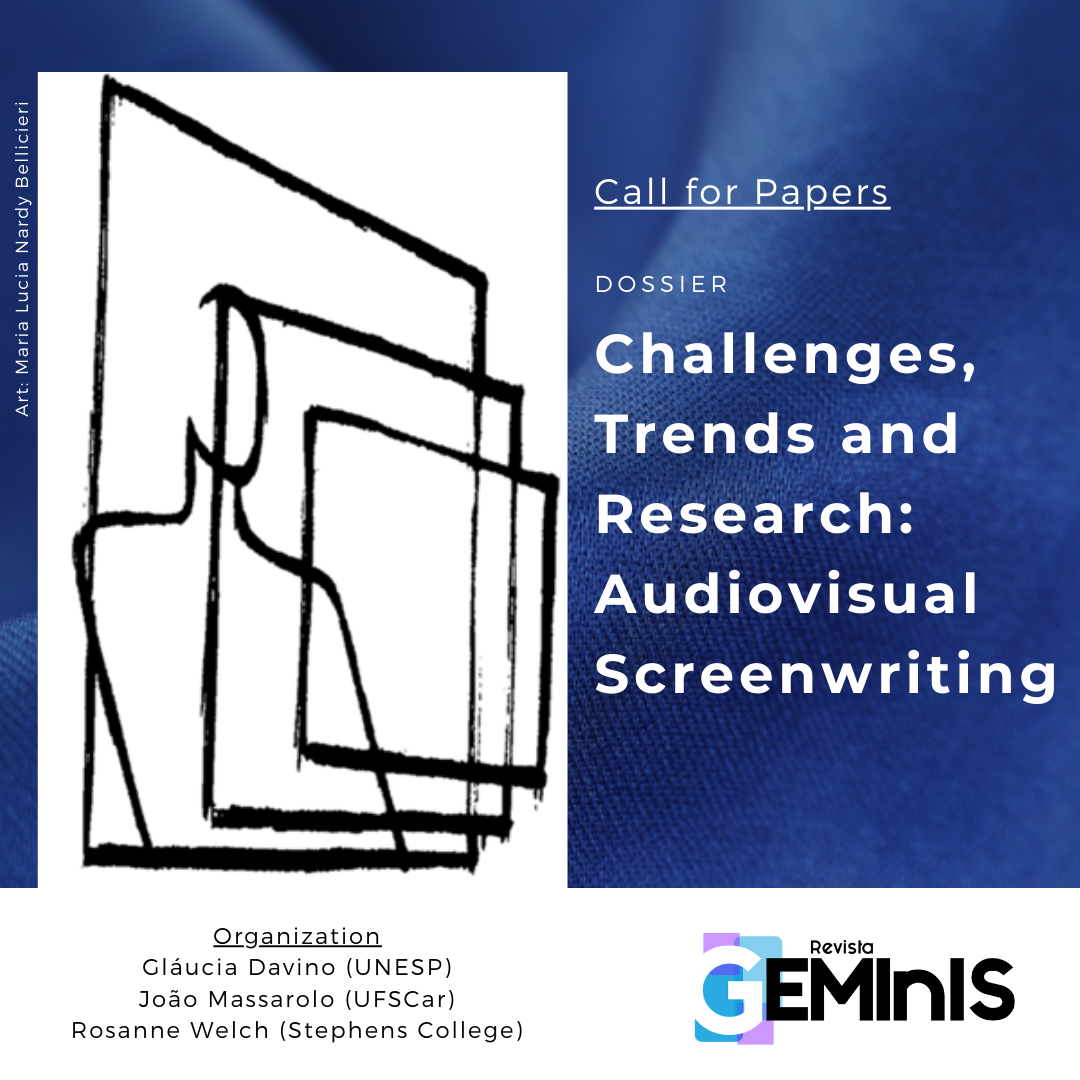The call for Papers on GEMInIS Journal is open until 03/14/2021 for articles, reviews, interviews and essays for the thematic Dossier: Challenges, Trends and Research. Audiovisual Screenwriting, having Gláucia Davino (IA, UNESP, SP), João Massarolo (Imagem e Som/UFSCar) e Rosanne Welch (Stephens College MFA in TV and Screenwriting) as coeditors.
From connoisseurs, amateurs, consecrated authors, curious people, to people interested in professionalizing, we have seen the growing interest in Screenplay Writing for Cinema and Audiovisual products, in the last twenty years, in Brazil. Initially, slowly, but then at an exponential pace as a result of market changes, the new perspectives provided by technologies, the possibilities for new expressive and participative experiences, the diversification of distribution formats and platforms and, mainly, the easy access to information on the topic that has fueled this trend.
In the professional aspect, the consolidation of ABRA, Brazilian Screenwriters Authors Association – in 2017, resulting from the merger of two previous associations, elevated the professional screenwriter from a previously unstable status and highlighted him towards his autonomy. In a parallel movement, movie and television launched public calls projects for professional writers and beginners to develop. Meetings, festivals, contests, creative workshops with international partnerships, and laws that kept fruitful movements in favor of the script emerged. We can say that the formal training of screenwriters was already non-existent. Still, in the late 1980s, higher education courses in cinema and RTV began to offer the study and practice of scriptwriting in the curriculum components. Later, educational institutions and experienced professionals were offering training courses. Today, it is no longer difficult to find a countless number of courses of varying levels and depth.
In the academic field, script studies, investigative and experimental research have been rare. The demands of the technical and cultural context of contemporary audiovisual, as we saw above, started to cause questions, previously inert, and on which scholars and researchers began to dedicate themselves. Sometimes, the script became a transversal theme to discussions about audiovisual and other areas of knowledge. However, it was the Screenwriters´ (hi)Stories Seminar, an academic pioneering event that effectively gave voice and visibility to investigations, reflections and experiments on scripting as the center of audiovisual on research projects and their respective researchers, in Brazil. Internationally, it is the SNR network – Screenwriting Network Research – that highlighted this same mission and has been spreading this culture brilliantly throughout the world.
Themes sugested but not limited:
• Creative process and digital resources
• Everybody is a screenwriter
• Interdisciplinarity
• Learning to be writer/ Learning to theorizing
• Screenplay analisys
• Screenplay Analysis
• Screenplay studies
• Screenplay studies/ Screenwriting studies
• Screenplay/writing Research Theories
• Theories and thinking
• Theorizing Screenplay and direction
• Theorizing Screenplay and Edition
• Theorizing Screenplay and Show runner
• Transcultural screenwriting
• Verbal language. What´s that means?
Papers submission is at the journal’s website: http://www.revistageminis.ufscar.br/index.php/geminis/about/submissions. The text must be in Portuguese, Spanish or English, in DOC format, and contain at least 07 pages or close to 2,500 words, and at most 25 pages, approximately 11,300 words. The structure of the article, the abstract, direct and indirect citations, references, images, tables, and tables must comply with the ABNT (NBR 06023) rules.
Preference is given to the publication of works in which at least one of the authors is a doctoral student or has a minimum doctoral degree. In addition to accepting papers related to the theme of the call, the journal also receives academic articles in a continuous flow, addressing other subjects related to communication and audiovisual areas, as well as essays, interviews, and book reviews recently published in Brazil and abroad. Priority will be given to papers submitted by doctoral authors or co-authored with doctoral researchers.
About Geminis
GEMInIS Journal was created in 2010, when the UFSCar Interactive Media Study Group on Image and Sound, coordinated by prof. Dr. João Carlos Massarolo completed his third year of creation. The magazine is online, free, and issued every four months. It aims to bring together scientific and artistic works that deal with phenomena typical of media convergence and audiovisual production in multi transmedia platforms. The publication is linked to the Graduate Program in Image and Sound – PPGIS / UFSCar,and has the Qualis B2 classification by Capes (Brazil), in the area of Communication and Information. More information: www.revistageminis.ufscar.br.







